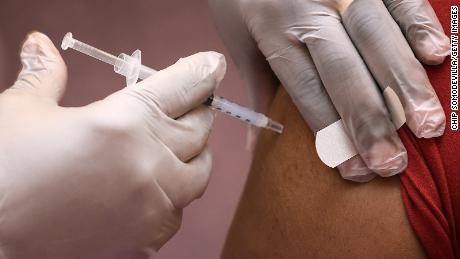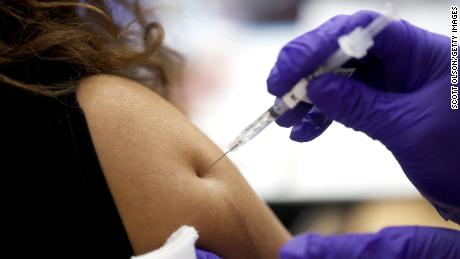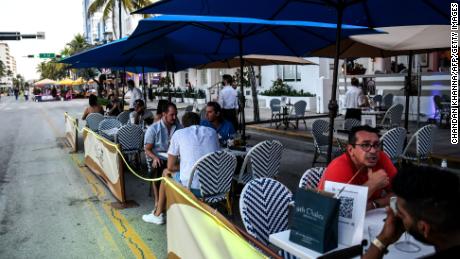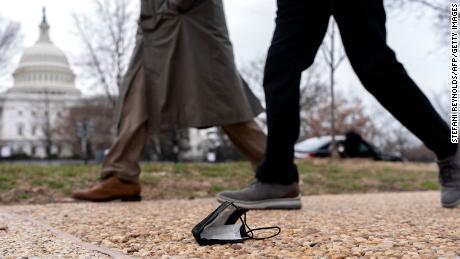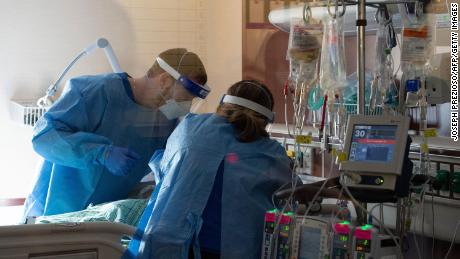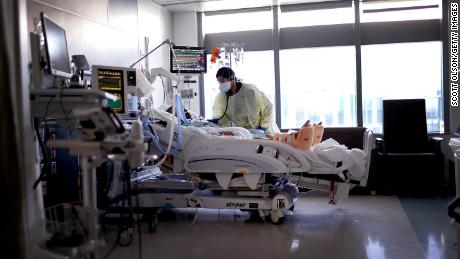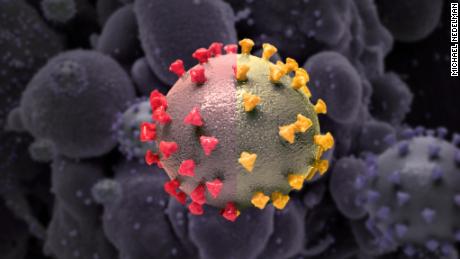Her stomach knotted in anxiety, Ogg was ready to say she was getting her first shot when actually she was getting her third. At the time, government rules didn’t allow for third shots, even for immune-compromised people like her who failed to develop antibodies after two doses.
“I was very nervous, because I am typically an honest person, but I wasn’t going to tell them the truth if they asked me. There was just no way,” said Ogg, 55, who was born with a cardiac defect and takes medicine to suppress her immune system so she won’t reject the heart transplant she received four years ago.
Many of them didn’t want to talk publicly last year for fear of being shamed, or even criminally prosecuted, but immune-compromised people tell CNN they lied — or were prepared to lie, or at the very least misled — pharmacists and other healthcare providers to get unauthorized doses of Covid-19 vaccine.
A senior physician at the US Centers for Disease Control and Prevention tells CNN that the agency knew about these unauthorized doses as they were happening, and that the government’s decision to later allow booster doses for this group rested largely on data generated by the very doses the government told people not to get.
The immune-compromised patients say they are allowing CNN to use their names because they want to tell their stories without shame, and want to hold the government accountable for, in their view, taking an inordinately long time to grant official approval for extra doses after studies had shown such doses were safe and possibly helpful to immune-compromised people.
“People sought [unauthorized] third shots because they feared for their life. We feared we were going to die if we contracted Covid,” said Janet Handal, a kidney transplant recipient who received her third shot in New York City in April of last year, months before the US Food and Drug Administration and the CDC gave their official OK to such shots.
the FDA amended its emergency use authorizations for Pfizer and Moderna to include a third dose for certain immune-compromised people. The next day,
the CDC recommended third doses for people who are moderately to severely immune compromised.
“The CDC was not protecting me,” Handal said. “I don’t know why it took them so long to act.”
A CDC spokesperson did not respond to CNN’s request for comment.
FDA spokeswoman Abigail Capobianco said, “vaccine providers should administer COVID-19 vaccines in accordance with the current EUA.”
‘I’m a rule follower’
according to the CDC.
When the Pfizer/BioNTech and Moderna vaccines rolled out in December 2020, no one knew if immune-compromised people would benefit from them.
Dr. Dorry Segev, a transplant surgeon then at Johns Hopkins University, decided to find out.
That month, Segev and his colleagues started what he calls a “real world observational study” to see how well the vaccine worked in people with compromised immune systems.
They found that many transplant patients weren’t getting antibodies after two vaccine shots, that third shots often did elicit antibodies, and that the extra dose did not seem to cause any safety problems.
medical journal JAMA on March 15, 2021, found that only 17% of 436 transplant patients had developed detectable antibodies a few weeks after a first dose of the vaccine.
France,
Israel and the
UK, were enough to convince
French health authorities to start recommending third shots for the immune-compromised on April 6.
All of that was enough to convince Handal to get her unauthorized third shot at the end of April.
Hopkins research letter published in JAMA showed that out of 658 transplant patients, 46% did not have measurable antibodies after two shots.
More transplant patients started to take matters into their own hands.
The Hopkins team followed 30 patients who got no or very low antibody levels after two shots and decided on their own to get third shots.
according to a letter published by the Hopkins researchers June 15 in the Annals of Internal Medicine.
Steven Weitzen, a heart transplant patient who lives in New Jersey, is a Hopkins study participant who got antibodies only after an unauthorized third dose.
“I’m a rule follower — that’s how I’m built,” Weitzen said. “But we had every reason to do this to save our lives.”
Weitzen and the other immune-compromised people interviewed for this story also noted that by late spring of last year, there was plenty of vaccine to go around, so they weren’t taking the shot from someone else.
On June 2, Dr. Anthony Fauci, President Biden’s chief medical adviser, noted that the vaccines weren’t working as well for immune-compromised people as for the rest of the population.
Fauci told CNN that the Hopkins study showed people on immune-suppressant drug regimens “make very poor immune responses” following vaccination, and that those patients “may feel they need an extra boost [but] we haven’t scientifically proven that that works.”
He added that the National Institutes of Health would soon start studying the best approach to protecting immune-compromised people. CNN asked Fauci if he could understand why immune-suppressed people were getting third shots ahead of those studies.
“Of course I can understand,” Fauci answered. “They know that they’re immunosuppressed, so they’re trying on their own before studies [are done] to see if they can do something about it.”
If someone had decided to wait for those study results, they would still be waiting.
The National Institute of Allergy and Infectious Diseases, where Fauci is the director, is sponsoring four studies on the immune-compromised and Covid-19 vaccines, and none of them has published its findings yet, according to Anne Oplinger, a NIAID spokeswoman.
Crossing state lines to get unauthorized vaccine shots
Weitzen said he didn’t have to lie to get his third dose last May. He made an appointment, showed up at a pharmacy near his home in New Jersey, rolled up his sleeve, and was given the injection.
Others, however, say it wasn’t quite so straightforward.
Phil Canuto, a kidney transplant recipient who lives in Ohio, got his third shot on August 15, two days after the CDC recommended them for immune-compromised people.
A blood test a few weeks later showed he still had only minimal antibody levels against the virus. Over the next few months, as the Delta variant raged across the country, Canuto grew more fearful that he would contract Covid-19.
“I felt basically unprotected,” he said.
CDC updated its guidelines to say the immune-compromised could start getting fourth doses. But the agency recommended a six-month interval between third and fourth doses and only two months since Canuto’s third dose.
October passed. Winter was approaching, and with it the expectation that cases would get even higher. Canuto decided he had to act to protect himself.
“I was obviously worried and not quite sure what to do. Ohio has a pretty good database, so if I’d gone in Ohio, they would have picked up” that he was getting a fourth shot earlier than allowed under CDC guidelines.
So, two days after Thanksgiving, while visiting family in Pennsylvania, Canuto went to a pharmacy and said he was there to get his first shot.
Moderna vaccine, which has been shown to be slightly more effective than Pfizer or Johnson & Johnson.
Moderna cut its dosage in half for its third shot, which is another reason Canuto told the pharmacist he was there for his first shot, so he would get the full-strength version.
After his first three shots, Canuto had felt fine. But the day after his fourth shot, he developed a fever, chills and a headache.
“I was ecstatic,” he said. “I never felt so happy to feel crappy.”
A blood test two weeks later showed he had high levels of antibodies.
“I was nervous when I got my fourth shot because I don’t like to lie or misrepresent myself,” Canuto said. “But the risk of getting caught and thrown out and embarrassed was worth the possibility of getting an antibody response. I’m absolutely glad I did it.”
Ogg and Handal also said their antibodies shot up after their unauthorized doses.
Around the time that Ogg got her unauthorized third shot on July 1, the Delta variant started to rage in the US. While she stayed home as much as possible, she still had to go out to doctors’ appointments and lab tests for her heart condition.
“There was a chance I could have gotten Covid, and if I had gotten it, there was a really high chance I would have died,” she said. “I don’t like to not be honest, but I did it to save my life and I would do it again.”
High anxiety
All of the patients interviewed for this story were ahead of the CDC and the FDA.
Months after Handal and Weitzen got their unauthorized third shots, and weeks after Ogg got hers, the FDA authorized them.
the CDC recommended a six-month wait. Then in February, the CDC shortened the time interval between third and fourth doses from six months to three months.
But immune-compromised people say this doesn’t take away the anxiety they felt when they had to break the rules.
Transplant Recipients and Immunocompromised Patient Advocacy Group. “Some people thought it was a crime, and we had to tell them it’s not a crime.”
Legal experts say she’s essentially correct. CDC guidelines are just that — guidelines, not laws — and the FDA’s emergency use authorizations direct health care providers, not patients, about what they can and cannot do.
Even if a patient were at a government vaccine distribution site and falsely attested to something on a written form, “there’s still no material fraud against the United States,” said Lawrence Gostin, director of the O’Neill Institute for National and Global Health Law at Georgetown Law. “And even if you could construe this as a crime, no one would prosecute it.”
Gostin said after what the immune-compromised have been through — getting vaccines that often didn’t produce antibodies, staying isolated at home for far longer than others – “to criminalize this would be a moral outrage.”
He said the FDA and the CDC “should have acted much more quickly in protecting the immunocompromised” and that “if anyone abdicated responsibility it was our agencies, not the frightened individual.”
Robert Field, a professor of law and public policy at Drexel University, was more sympathetic to the federal agencies, saying the pandemic presented “a brand new challenge for the regulatory apparatus” because the vaccines and the rules around them were developed so quickly.
“It is really new public health terrain,” Field said. “I don’t think you can put this all on regulators. They have to balance safety and potential benefits of the vaccines in the face of limited knowledge.”
Field added that legally, it made sense that the FDA had to first authorize additional doses before the CDC could recommend them.
“I don’t think [the CDC] can encourage people to do something that is not in compliance with an FDA authorization,” he said.
He added that he understood why immune-compromised people chose to get the doses without a green light from any government agency.
“From a public health point of view, it certainly made sense for people to get the booster dose,” he added. “It’s an unfortunate bureaucratic contradiction, and we’ve seen a lot of those under Covid because the public health threat and the application of the laws are so new. This is largely uncharted territory.”
CDC knew about illicit doses
It turns out the CDC knew the whole time that people were breaking the rules, according to a senior physician there.
“We were aware of the phenomenon,” the CDC doctor said. “We actually monitor it — for those states that share their vaccine registry with us, we could see that people were engaging in this practice.”
And of course, CDC scientists read the Hopkins studies. In fact, the CDC doctor said the government’s okay for extra doses relied to a great extent on the Hopkins data on people who broke the rules and got unauthorized shots — something Segev, who led the Hopkins study calls “a strange irony.”
The CDC physician was asked what he told immune-compromised friends last year who wanted to know if they should get unauthorized doses.
“As a federal official, I cannot officially endorse that,” the doctor answered. “But as a human being, I understand that. If it’s going to allow you to take care of something personal and you’re ok with it ethically and there are no medical contraindications, I would endorse it.”
The doctor asked not to be identified based on longstanding norms about government employees speaking to the media.
Segev, the transplant surgeon who led the Hopkins research and is now at NYU Langone Health, said he understands why the initial vaccine clinical trials excluded immune-compromised people. He said it was known that the vaccines might not work well in this group, and their poor results could skew the results for everyone else.
But he wonders why there weren’t separate clinical trials done early on with immune-compromised participants.
“That wasn’t done, and it put everyone in a bind,” he said.
He thinks back to the participants in his study who went against FDA and CDC rules last spring and summer and got extra doses, making every effort to protect themselves just before and during the Delta wave.
He shudders to think what would have happened if they’d followed along with government guidance and not gotten those additional shots, going unprotected as Delta spread.
“It would have been a disaster,” he said. “An absolute disaster.”
CNN’s Danielle Herman contributed to this report.

